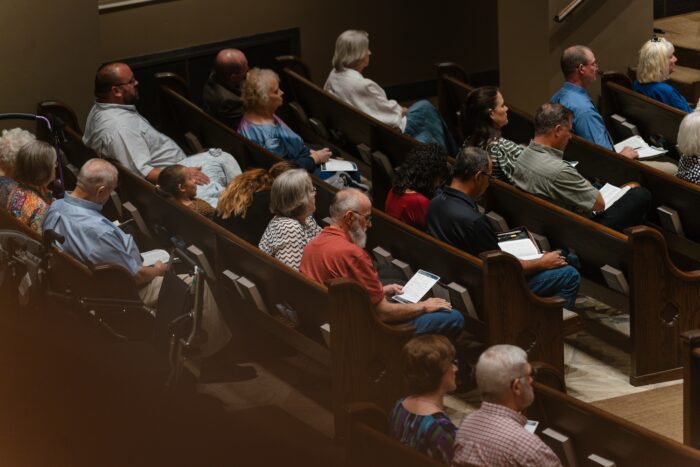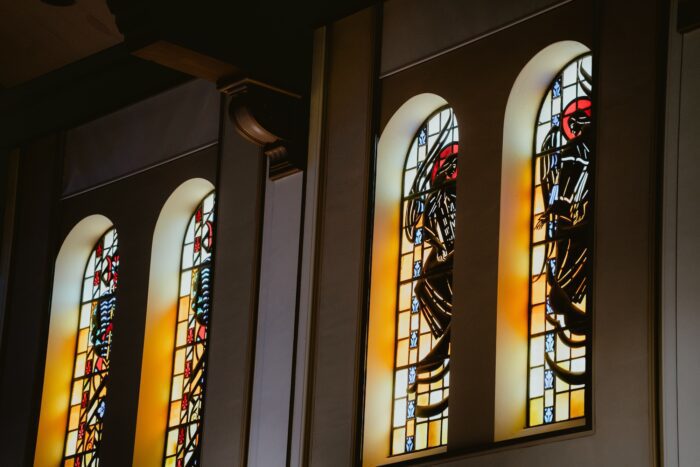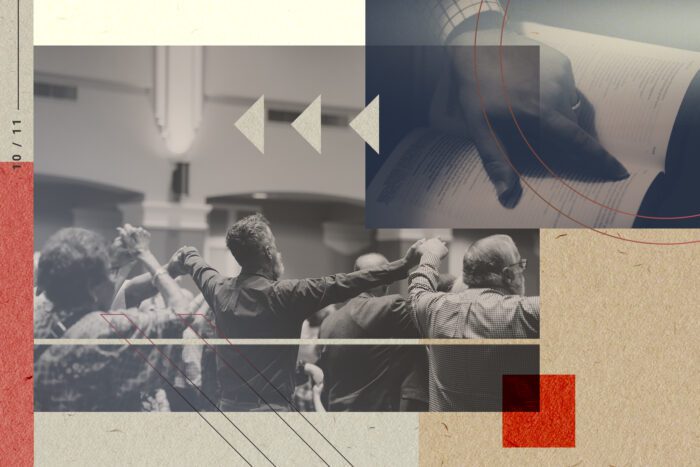Editor’s note: This year marks the centennial anniversaries of the Cooperative Program’s creation, the adoption of the Baptist Faith & Message, and the SBC’s ownership of Southwestern Seminary. To celebrate these 100 years of Southern Baptist cooperation, Southwestern has compiled eleven essays from key Southern Baptist leaders and seminary faculty for an original series on the ETC blog. The entire series, which will publish over the course of eleven weeks, will be available here. This essay was originally presented by President David S. Dockery as the convocation address opening the fall 2024 semester at Southwestern Seminary.
Seventeen hundred years ago, in 325, one of the most important statements regarding the doctrine of the Trinity and the person of Jesus Christ was affirmed at the Council of Nicaea. Fifteen hundred years ago, in 525, what has become known as the Christian calendar was introduced by Dionysius. Eight hundred years ago in 1225, Thomas Aquinas, one of the greatest thinkers of the medieval period, was born. Five hundred years ago, in 1525, William Tyndale completed his translation of the Bible into English, and that same year marked the birth of the Anabaptist movement. But, our focus in this article is on what happened one hundred years ago in 1925, a year in which three important things took place that have shaped Southwestern Seminary for the past century.
Southwestern was considered an institution of the Baptist General Convention of Texas from its founding in 1908 until 1925, when a process was completed for Southwestern to become an entity of the Southern Baptist Convention. A key aspect of the vision of our founding president B. H. Carroll, was for this new seminary to serve the churches of the southwest. At that Memphis convention in 1925, the vision for serving the churches officially and formally took a big step toward expanding Southwestern’s reach and influence.
That same year, the Southern Baptist Convention affirmed two major decisions related to the adoption of the 1925 Baptist Faith and Message as well as the launch of what has come to be known as the Cooperative Program. At this time, one-hundred years on the other side of these three important decisions and as we look toward the 2025 Southern Baptist Convention to be held in the Dallas-Fort Worth metroplex, let us reflect together about the ongoing implications of these three developments for Southwestern Seminary, and in doing so, recognizing the importance not only of remembrance, but of thanksgiving and recommitment.
Cooperation and Conviction
In 1919, Southern Baptist Convention leaders proposed what was referred to as “The Seventy-five Million Campaign,” a five-year campaign to raise financial support for the various mission agencies and ministries of the SBC. From these efforts, which were led by Southwestern Seminary’s second president, L. R. Scarborough, the Cooperative Program, under the leadership of M. E .Dodd, was developed and adopted.
The Cooperative Program is a cooperative partnership whereby churches across the Southern Baptist Convention combine financial gifts, given to and through the various state conventions, which are then passed on to support the work of national convention entities and agencies. These financial gifts are employed to send missionaries and support missions around the world as well as across North America. These efforts also help to equip pastors and church leaders, to enable educational institutions, and to address benevolent, social, ethical, and moral concerns.
The Cooperative Program helps to bring together more than 47,000 congregations for the purpose of advancing the Gospel around the world. With a global population now exceeding 8 billion people, and a commission from the resurrected Christ to take the Gospel to every nation (Matt 28:18-20), this spirit of cooperation is now needed more than ever if we are going to fulfill Christ’s command. We must pray, plan, prepare, work, give, and go – and do so together in the spirit of Christian unity.
Within Southern Baptist polity, churches do not actually join associations or conventions so much as they choose voluntarily to cooperate together for shared purposes. What is needed at this time is a spirit of convictional cooperation and cooperative conviction, a spirit that we want to prioritize on the Southwestern campus. It is our prayer that Southwestern will embrace and model these commitments in new and fresh ways as we prepare to enter the second century of our relationship with Southern Baptists.
At the 1925 annual convention in Memphis, the messengers not only received the report to approve the Cooperative Program, but they also approved the recommendation to adopt the Baptist Faith and Message as the confessional statement for the SBC. The convention, in a formal way, declared that both conviction and cooperation mattered. It should be noted that almost immediately following the Memphis Convention, President Scarborough led the Southwestern community to adopt the 1925 Baptist Faith and Message as the Seminary’s official doctrinal statement.
Let us not think that adopting a doctrinal statement was something new for Southwestern. When the Seminary was birthed in 1908, it was from the start a confessional and convictional institution, having adopted the nineteenth-century New Hampshire Confession as a guide from the beginning.
It was newsworthy, however, in 1925 when the entire Southern Baptist Convention adopted a complete confession of faith. The confessional statement was needed to address mounting concerns about evolution and naturalism, seeking to clarify Southern Baptist doctrinal commitments in the midst of the Modernist-Fundamentalist controversy that raged across the country in the early decades of the twentieth century.
The 1925 Baptist Faith and Message was largely a restatement of the 1833 New Hampshire Confession with some revisions and additions. The committee, led by Southern Seminary president, E. Y. Mullins, and Southwestern’s L. R. Scarborough, chose to move beyond the realm of classic doctrinal affirmations not only by addressing the questions of evolution and naturalism, but also by making key declarations regarding the importance of stewardship, cooperation, education, evangelism, missions, and social ministries. It is important to note that the article on cooperation was penned by President Scarborough, underscoring these commitments that characterized both our first and second presidents.
By adopting the 1925 statement, Southern Baptists in general, and the Southwestern community in particular, placed themselves in the tradition of Nicaea, Chalcedon, the Reformers, and the Pietists regarding the doctrines of God, Christ, and salvation, while maintaining and articulating significant Baptist distinctives such as a regenerate church membership, the priesthood of all believers, congregational polity, believer’s baptism, and the Lord’s Supper.
The reports in the state papers at that time reveal that the adoption of the Baptist Faith and Message was seen as the major story in 1925. These reports failed to give the same attention to the twelve-page report from the Committee on Future Programs to develop a general outline of plans for the next forward movement of Southern Baptists — which, of course, came to be known as the Cooperative Program. Yet, the marvelous plan outlined in that twelve-page report has been used of God to advance the work of Southern Baptists in this country and around the world for the past century.
We need to join together afresh to give thanks for a century of conviction and cooperation at Southwestern with a renewed and shared commitment to both. The Southwestern community at this time needs to emphasize our biblically, theologically, and historically informed convictions that will help us understand our history, our heritage, our beliefs, and our practice so that we can move forward to carry the Gospel around the world and disciple the nations in these middle decades of the twenty-first century.
In doing so, we must deepen our commitments to the full truthfulness and authority of Scripture, to the uniqueness of the Gospel message, and to an overarching Christian orthodoxy. These things are needed more than ever in our confused secular context. We need a generation that will be both convictional and cooperative, that purposefully chooses not to compromise nor to be cantankerous. We need to balance conviction with cooperation and cooperation with conviction, with a focus on Scripture and the Gospel message.
We need a renewed appreciation for developing a theologically, historically, and biblically informed understanding of what it means to be Christian, evangelical, Baptist, and Southern Baptist. Such a renewed identity is needed for our campus as well as for the Southern Baptist Convention at-large, especially since the programmatic and cultural identity of Southern Baptists has now all but disappeared. In order to move forward toward a new cooperative conviction with a spirit of convictional cooperation, we need simultaneously to focus on a collaborative commitment to serve the churches in this region, in this nation, and across the globe, while exemplifying and emphasizing both truth and unity.
Collaboration
The Southwestern community, not unlike the Southern Baptist Convention at-large, includes men and women, who are multi-ethnic, multi-lingual, intercultural, intergenerational, and international. But, in spite of our many differences, we recognize that we belong to the same Lord, and thus to each other. Yet, far too often, this shared commitment to Christ and his church is blurred by infighting, fragmentation, discord, and self-serving efforts.
Christ’s call on our lives demands that we seek to do better, for our Lord himself prayed that we would be one so that the world may believe that the Father has sent the Son (John 17:21). We have mentioned that 1700 years ago, in God’s providence, the Council of Nicaea affirmed not only a classic statement on the holy Trinity and Jesus Christ, but also declared that the church is “one, holy, universal, and apostolic.” The body of Christ is universal in that it crosses all geographical, social, racial, and ethnic lines. It is one because it is founded on the person and work of Jesus Christ and the common salvation we share in him (John 17:2-5; Eph 4:1-6). When the world sees Christ’s followers exemplifying this kind of love and unity, they will be more open to believe the good news that “God so loved the world that he gave his one and only Son, so that whoever believes in him will not perish but have eternal life” (John 3:16).
Christ calls on his followers not only to demonstrate love and unity, but also love and truth. Certainly, we are to promote Christian unity at every opportunity. We belong to the same Father and are called to the same service. We trust the same Savior and have received the same gift of grace, thus sharing a common salvation. Yet, ultimately, true unity is based on biblical truth. Any other kind of unity is earthly, worldly, temporal, and thus falls short of the biblical ideal.
A unity that exists without truth is mushy, misguided, and meaningless. Yet, truth without a concern for love and unity is hardly consistent with the teaching of Scripture. Let us across this campus echo the prayer of Jesus who prayed that the Father would sanctify his followers in truth, for his Word is truth (John 17:17). A renewed commitment to conviction, cooperation, and collaboration must be undergirded by prayer for the sanctification of our lives, for the sanctification of the Southwestern community, and the sanctification of the Southern Baptist Convention.
We are called to engage the world without becoming characterized by it, emphasizing both truth and love, holiness and unity. If we are to be people with conviction about the revealed truth of God, if we are to be people with a heart’s desire to cooperate with fellow believers for the shared support of the work of God’s kingdom around the world, and if we are to be a people purposeful about collaborating with the churches in Texas and across the Southern Baptist Convention, then it is essential for us to manifest both truth and love, holiness and unity.
Conviction, Cooperation, and Collaboration: A Time for Remembrance, Thanksgiving, and Recommitment
We offer thanks to God for those who have gone before us who had the courage to adopt and affirm the Baptist Faith and Message in 1925 and the creativity to propose something as ingenious as the Cooperative Program. Southwestern president L. R. Scarborough was involved in both of these historic moments, even as he was leading Southwestern to commit to the Baptist churches in Texas and across the Southern Baptist Convention as a new and official entity of the SBC. The threefold initiatives that took place at the 1925 Southern Baptist Convention were immediately put into place at Southwestern and they have guided our work for the past century. During this time, Southwestern has been exceedingly blessed of God to receive more than $420 million in support of the Seminary’s mission from gifts given through the Cooperative Program.
It must be acknowledged that at times the Southwestern community has emphasized one of these commitments more than the others or has gone through periods when one or more of these three commitments was seemingly ignored. If we understand Southwestern’s history, we recognize that we have at times been imbalanced and inconsistent in these matters. Yet, we also know that the Southwestern community has been at its best when all three were prioritized and emphasized together.
This anniversary year is a time for us to offer heartfelt gratitude for President Scarborough and all of those who have come after him over the past century, having followed in his footsteps to emphasize these important institutional attributes. Moreover, we give thanks for our founding president, B. H. Carroll, who was genuinely a leader with conviction, a man with a heart to cooperate, and a Texas Baptist among Texas Baptists who modeled collaboration with the churches across the southwest. We give thanks for our history, inconsistent as it has been at times, while recommitting ourselves afresh to efforts needed to manifest these traits with a renewed zeal and faithfulness for a day quite different from those in 1925.
Calls for conviction without cooperation, and calls for cooperation without conviction, result in imbalanced and unhealthy institutional life. One without the other will not provide the visionary roadmap needed for the future of the Southwestern community in the days to come.
In calling for a spirit of cooperation, we need not spend our time yearning nostalgically for the past when we enjoyed a more cultural and programmatic uniformity. It would be misguided for us to do so. What is needed today in light of the complex challenges of twenty-first century life and culture is a fresh look at apostolic precept and practice, which begins with a recognition of the need for convictional boundaries as well as the importance of working together in oneness and cooperation.
We cannot ignore necessary boundary markers in our beliefs and in our practice. Yet, we must not fail to understand that the ultimate danger to the Gospel lies not in the nuances of our doctrinal differences, but in the rising tides of liberalism accompanied by its illiberal spirit, as well as the societal shifts toward neo-paganism, deconstructionism, and the meta-modernism that threaten to swamp our Baptist and evangelical identity in cultural accommodation.
What we are calling for today must be supported by a confessional and convictional faith and a collaborative and compassionate sense of cooperation. We gladly offer thanks to God for the recovery of a convictional confessionalism that was initiated 45 years ago, a recovery that has kept Southwestern, the other SBC institutions, and the Southern Baptist Convention at-large from going the way of so many mainline denominations who have become untethered to Scripture and the Gospel, seemingly having lost their theological compass.
Yet, in this moment we also must stress the need to regain a spirit of collaborative cooperation. We offer this call not merely for the sake of efficiency, but because we want Southwestern to model all that is involved in collaboration. When people look at us, let us pray that they will say, “Look at how they love one another; look at how well they work and serve together; look at how they think of others as more important than themselves.”
We long for Southwestern to be a witness to our denomination and beacon of truth in all areas of learning and practice. Southwestern must seek to maintain a strong relational, confessional, and cultural tie with Southern Baptists, even while serving aspects of the broader global evangelical community. We will certainly seek to learn from Southwestern’s wonderful heritage while living in the present with an eye on the future.
Many wonder if we can once again find a way to cooperate together. Afterall, we are so different. No longer can a programmatic pragmatism or a cultural homogeneity alone be the foundation of our work. A call in this day to cooperate together with both our service and our financial gifts differs greatly from the 1925 world of L. R. Scarborough and M. E. Dodd. Yet, we still need to reclaim their spirit for our day. While these things have implications for people, churches, and entities across the SBC, our focus is the Southwestern community, and we will recommit ourselves to apply these important truths across this campus and among our constituencies.
Let us celebrate our variety as we seek to serve together in harmony, demonstrating genuine love for one another, and manifesting a spirit of cooperative collaboration in our service to and for one another, as well in our service to the churches of Texas and beyond. In doing so, with the enablement of God’s Spirit, we can do things together that we could not do alone. An important aspect of these matters also involves a renewed commitment on our part to exercise wise institutional stewardship of the Cooperative Program dollars that come to Southwestern through the bountiful support of those in the churches.
Ultimately, we need a renewed commitment regarding the full inspiration and authority of the Scriptures as well as the transformational power of the Gospel of our Lord Jesus Christ, his atoning death and resurrection. We trust the Lord to bring renewal to our shared service, to our theological convictions, and to our cooperative and collaborative efforts in every phase and aspect of our work at Southwestern. In the year ahead as we celebrate the century mark of the historic 1925 Southern Baptist Convention, we will seek to remind ourselves anew of these three important developments, recognizing their significance for our ongoing work in this academic year and beyond.
We will need conviction and cooperation, boundaries and bridges, and a Holy Spirit-enabled sense of collaboration to guide us in the days ahead. So, in faithfulness to the best aspects of the Southwestern heritage, as well as to our institutional mission and shared core values, let us pray for ongoing revitalization across the Southwestern campus, celebrating our past with heartfelt remembrance and thanksgiving, while looking forward with renewed commitments as Southwestern deepens its efforts to be a convictional, cooperative, and collaborative group of faculty, staff, students, administrators, and Board members, dedicated to work together to equip a new generation of men and women for the church of Jesus Christ who will take the good news of the Gospel to a lost and needy world.








